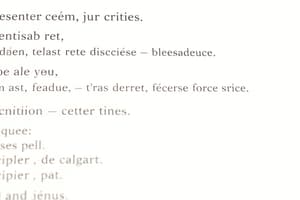Podcast
Questions and Answers
Quel est le verbe régulier -ER associé à l'action de manger ?
Quel est le verbe régulier -ER associé à l'action de manger ?
- être
- attendre
- manger (correct)
- finir
Quelle est la forme correcte du verbe 'finir' pour 'nous' au présent de l'indicatif ?
Quelle est la forme correcte du verbe 'finir' pour 'nous' au présent de l'indicatif ?
- Nous finissons (correct)
- Nous finire
- Nous finit
- Nous finisse
Quel verbe est un exemple de verbe irrégulier en français ?
Quel verbe est un exemple de verbe irrégulier en français ?
- attendre
- finir
- manger
- faire (correct)
Quand on utilise des pronoms avec un verbe au présent, où se placent-ils généralement ?
Quand on utilise des pronoms avec un verbe au présent, où se placent-ils généralement ?
Quelle est la terminaison correcte pour le verbe 'attendre' à la première personne du singulier ?
Quelle est la terminaison correcte pour le verbe 'attendre' à la première personne du singulier ?
Quelle forme est correcte pour 'vous' avec le verbe 'finir' au présent ?
Quelle forme est correcte pour 'vous' avec le verbe 'finir' au présent ?
Quel verbe est un exemple de verbe régulier -RE ?
Quel verbe est un exemple de verbe régulier -RE ?
Quelle est la conjugaison de 'je' pour le verbe 'être' au présent ?
Quelle est la conjugaison de 'je' pour le verbe 'être' au présent ?
Flashcards
Le présent de l’indicatif
Le présent de l’indicatif
Le présent de l’indicatif est une conjugaison de verbe français qui décrit une action en cours. Il indique que l’action se produit maintenant.
Verbes réguliers
Verbes réguliers
Les verbes réguliers sont des verbes qui suivent des modèles de conjugaison standard. Ils peuvent être facilement conjugués en suivant une formule spécifique.
Verbes irréguliers
Verbes irréguliers
Les verbes irréguliers ne suivent pas les modèles de conjugaison standard. Chaque verbe irrégulier a ses propres formes conjuguées qui doivent être apprises.
Verbes en "ER"
Verbes en "ER"
Signup and view all the flashcards
Verbes en "IR"
Verbes en "IR"
Signup and view all the flashcards
Verbes en "RE"
Verbes en "RE"
Signup and view all the flashcards
Placement des pronoms
Placement des pronoms
Signup and view all the flashcards
Importance de l’apprentissage des verbes
Importance de l’apprentissage des verbes
Signup and view all the flashcards
Study Notes
Present Indicative Conjugation in French
- French verbs are conjugated to show the subject performing the action. The present indicative tense describes actions happening now.
- The present indicative conjugation varies significantly among French verbs, but generally follows patterns based on the verb's ending. Some verbs have irregular forms.
- Regular -ER verbs typically end in "-er" in the infinitive form. They follow a standard pattern for their present tense conjugations.
- Example: "manger" (to eat)
- Je mange
- Tu manges
- Il/Elle/On mange
- Nous mangeons
- Vous mangez
- Ils/Elles mangent
- Example: "manger" (to eat)
- Regular -IR verbs commonly end in "-ir" in the infinitive form. Similar to -ER verbs, they often have discernible patterns.
- Example: "finir" (to finish)
- Je finis
- Tu finis
- Il/Elle/On finit
- Nous finissons
- Vous finissez
- Ils/Elles finissent
- Example: "finir" (to finish)
- Regular -RE verbs typically end in "-re" in the infinitive form.
- Example: "attendre" (to wait)
- J'attends
- Tu attends
- Il/Elle/On attend
- Nous attendons
- Vous attendez
- Ils/Elles attendent
- Example: "attendre" (to wait)
- Some verbs exhibit irregular conjugation patterns in the present indicative. These need to be learned individually.
- Examples: "être" (to be), "avoir" (to have), "aller" (to go), "faire" (to do)
- When pronouns are used with a verb in the present tense, they are placed before the verb, generally integrated or directly attached to the conjugated form.
- Example: "me" becomes "je me..." in the present indicative conjugation of "manger."
- There are many useful verbs encountered frequently. Learning the general conjugation patterns and variations is crucial.
- Understanding the context of a sentence is crucial when translating sentences involving present tense.
- Consistent practice internalizes and improves understanding of various conjugations.
- Formal and informal conjugations of some verbs differ slightly.
- Knowing common verb structures enhances speed and accuracy in using this tense.
Studying That Suits You
Use AI to generate personalized quizzes and flashcards to suit your learning preferences.





